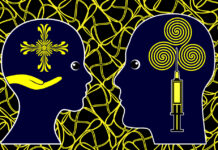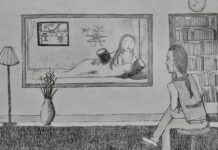The anxiety had gotten so bad that I begged for a magic bullet. “Anything to make it stop, and pronto,” I pleaded with the psychiatrist.
Anxiety is a hot mess of a malady. It’s a caffeine overdose, an adrenaline drip on a nauseating roller coaster that pauses but briefly in cosmic ditches of depression. Dread loiters in lobbies and bookshops and on random street corners. Bouncing between non-stop heart palpitations and daily panic attacks, the distant and retreating sense of reality is infected with the flavor of a living nightmare.
In other words, it sucks.
Yet not as much as the SSRI that I was prescribed. The effect was utterly ugly. I spent the night wired and wide awake, sweating buckets while clutching the bed sheets. By dawn, all signs of the zombie apocalypse were gone, but it would take until lunch before my eyes were able to focus again.
The anxiety was bad enough, but this “cure” was a different kettle of catastrophe. My body had said no, in the clearest terms. I called the psychiatrist to explain what had happened. She urged me to persist for a couple of weeks until the side effects passed. There was nothing “side” about these effects, I explained, so she offered me a different brand. But I was not made of such stern stuff. And so I stumbled as a whimpering wreck onto the lesser-traveled road to recovery — the path of surrender and acceptance.
Inadvertently, the chemical cosh had given me a knock in the right direction.
I had encountered others online who recovered from so-called “generalized anxiety disorder” through a deep and radical acceptance. It seemed less predictable, and quite paradoxical, but something about it resonated with me, and often took the edge off my fear.
As a person who has since become as calm as a Hindu cow, I thank my lucky stars that the drugs didn’t work — scary as the fact was at the time. It marked a profound turning point in my life. I was forced to change the habits of an unhealthy lifestyle and eventually undo my indulgence in constant worry. I was forced to turn to mindfulness, as the prime practice of acceptance.
Acceptance was not an easy journey, but it created the space for personal growth and learning. Through understanding my anxiety, I came to recognize it as an amplification of the current of fear that is part of the human condition. It sometimes felt reckless and irresponsible to simply sit with overwhelming waves of panic in meditation, and do nothing about it. But that eventually taught me that my fear was a paper tiger. It had only the significance I gave it; if I didn’t engage in fearful trains of thought and “what if” fantasies, the threat of overwhelm and annihilation would crash over me, and through me, and wash onwards, leaving nothing in its wake but a newfound (although initially subtle) sense of peace. By learning to simply return my attention to my object of meditation — usually the breath — I was disinvesting in the fear, and becoming less impressed with the strange cornucopia of symptoms that comes with anxiety.
Part and parcel of this long personal journey — beset with doubts and tears and setbacks — was the relinquishing of a paradigm or world view. The time had come to slough off the prism through which I viewed reality. This meant waking up from some of my cultural conditioning, like my excessive reliance on external authority.
When you boil it down, the standard care in our culture for difficult and intense inner experience is Freud or Prozac, or a combo. Dependent on the aims, and under the right conditions, these approaches may have real benefits, but they also betray an individual’s loss of inner faith and intuition.
Confronted by severe anxiety, talk therapy often falters by implicitly encouraging us to think our way out of it — a common impulse, but counterproductive. Through my own experiences, I can appreciate the benefits of talk therapy, but its effectiveness in unwinding heightened neurosis is inconsistent, to put it kindly. Why? Carl Jung said it best: “In psychology one possesses nothing unless one has experienced it in reality. Hence a purely intellectual insight is not enough, because one knows only the words and not the substance of the thing in itself.”
And then there are those who push the Prozac, but who can blame them? The world abounds with people like me who beg for magic bullets. And as individuals, psychiatrists are undoubtedly well-intentioned. But the Prozac paradigm undermines the path of acceptance by its very agenda to “get rid of” or “fix” anxiety. It is by its nature a resistance — and what you resist, tends to persist.
Too often the “disorder” is described as a random thing, a spot of rotten luck. It is supposedly a “chemical imbalance,” as if that explains it. Questions of what might underlie this imbalance seem to prompt a minimum response. Stress is rarely implicated — perhaps because stress-reduction and lifestyle change is not for sale from this vendor, only chemical “correction.” Relaxation is rarely mentioned.
According to reductionist materialism, the brain creates consciousness. And so, my amygdala was apparently causing my anxiety. Bad amygdala! But this didn’t make sense to me, because of the simple fact that a few weeks of mindfulness practice serves to shrink the amygdala, significantly. Perhaps my brain wasn’t the problem.
Meditation is a practice that doesn’t (and shouldn’t) linger long within the medical paradigm. It is foremost a spiritual practice, and reconnects us to our inner spiritual potentials. So, is it not perhaps a problem of paradigm to begin with? Is our modern world’s anxiety epidemic a deficiency of serotonin, or a deficiency of spirit?
I believe it is the second, not only because of the transformation I experienced myself, but also because of the transformations I’ve seen in the people I’ve counseled over the years. I’ve seen how often the pills don’t work as advertized, and how they create complications in the long run. I’ve seen too many genuine, lasting transformations through reconnection to spirit (however that may look for an individual) to chalk it up to chance. And I’ve seen how the medical paradigm hampers this process of transformation through its reductionism.
What’s invariably required is not a medical recovery, but a personal evolution. And the first step on this widening spiral of growth is deep, radical acceptance.
As a skittish sort in search of reassurance, I sought reputable endorsements for the path of acceptance. I found these in authors like Claire Weekes and Dorothy Rowe, in transpersonal psychologists like Stanislav Grof and Michael Washburn, and most notably in skillful meditation teachers, from Eckhart Tolle to Pema Chödron to Chögyam Trungpa. Through their written works, these names became my saviors.
Our modern rational attitude has thwarted and repressed the spiritual dimension of life often — what Carl Jung considered a fundamental psychic function of tremendous significance. Jung recognised that there is limited personal healing without regaining a religious outlook on life. What he meant had little to do with religion or ritual or metaphysics, but rather with regaining a certain sense of soul. For me, spirituality entails attentive stillness. It also suggests a greater capacity for love and compassion. It invites a closer relationship to nature, and the promotion, in ourselves and in the world, of goodness, truth and beauty.
After the anxiety faded away — thanks to some personal changes, various relaxation exercises and the spaciousness of acceptance — I was eventually called to offer others an alternative to the standard Freud/Prozac approach, through my unique stress-reduction workshops. My book Angel of Fear presents the thesis that anxiety, far from being a medical malady, is a call to transformation. It is consciousness prompting a wider paradigm and a deepening compassion.
The woods are dark, and full of terrors. No wonder travelers band together and stick to the well-trod lane where a little sunlight reaches down. No wonder, also, that the other path is so rarely taken. It is off to the side, overgrown and gloomy — it seems to lead deeper into the woods, and is uphill most of the way.
I struggled up that other path, and couldn’t be more grateful. I saw for myself that the rumors were true. It leads upwards in a spiral, until it opens out onto a mountaintop clearing, where sun and sky abound and your gaze roams freely over a wide country.
From here you can also see your fellow travelers below. “Don’t look up,” say their guides. “There’s nothing there. Just keep in this direction. We know the way.” And from your vantage you can track the lane they’re on, and it only goes in a big flat circle, round and round the mountain, but never up.















It says something about your psychiatrist, that she didn’t know that anxiety can be the result of magnesium deficiency- the heart palpitations are a giveaway. I bet she didn’t ask you if you suffered from cramps in addition to the palpitations. You may think of me as crass, but that is why I don’t suffer from leg cramps at night, anymore.
Report comment
yes, learning to embrace life along with the pain that comes was a big move forward for me, too, especially for the healing path my wife and I have been on thru her d.i.d. take care…
Report comment
If someone is feeling anxiety, then obviously it is for good reason. They may not really know what the anxiety is over, but undoubtedly it pertains to threats against their health, well being, and safety.
So then the last thing in this world that they need is Psychiatry, Psychotherapy, Life-Coaching, or Recovery. Rather, they need to be able to work with comrades in fighting against injustice.
And we on this forum, need to make our own anti-mental health and anti-recovery forum.
Please Join:
http://freedomtoexpress.freeforums.org/index.php
Nomadic
Report comment
If their anxiety is over the imminent return of Martians to continue to wage war against aliens from Zeneith, maybe they need to see a professional?
Report comment
They might want help to alleviate their suffering. But help which would label them as a schizophrenic for life and make them revolving door patients? Maybe or maybe not.
Report comment
Hi Albert,
Beautiful Story. Thich Nhat Hanh says the Christians believe we reach heaven in the next life but in Buddhism it’s believed that it can be reached in this life.
I’ve experienced the same relief as you from mindfulness. It’s nice to know that there are non expensive really successful solutions available.
Report comment
Inspiring to read. Well done.
Report comment
Thank you Albert for sharing your story. It seems you have found so much truth and strength by tapping into your fear. It seems you have transcended your fear and that is so beautiful.
I am myself trying to find this path.
I have also come to the conclusion that in order to grow as a human being we have to know our deepest emotions because they are telling us something vitally important.
As so many others I was put on medication to suppress these emotions.
Thank you again for sharing your truth! By doing so I think you help people to lift their eyes towards the mountain top.
Report comment